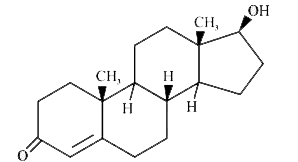The number of peptide hormones among insulin, testosterone, oxytocin, thyroxine, vasopressin, cortisone is
The correct Answer is:3
To determine the number of peptide hormones among the given options (insulin, testosterone, oxytocin, thyroxine, vasopressin, cortisone), we can categorize each hormone based on its structure and classification.
1. Identify the Hormones: The hormones given in the question are:
- Insulin
- Testosterone
- Oxytocin
- Thyroxine
- Vasopressin
- Cortisone
2. Classify Each Hormone:
- Insulin: This is a peptide hormone. It is a protein made up of amino acids and is involved in glucose metabolism.
- Testosterone: This is a steroid hormone, derived from cholesterol. It is lipid-derived and not a peptide.
- Oxytocin: This is a peptide hormone. It is a small protein made up of amino acids and is involved in various functions including childbirth and lactation.
- Thyroxine: This is an amino acid-derived hormone, specifically derived from the amino acid tyrosine. It is not a peptide.
- Vasopressin: Also known as antidiuretic hormone (ADH), this is a peptide hormone. It is involved in regulating water balance in the body.
- Cortisone: This is a steroid hormone, similar to testosterone, and is lipid-derived.
3. Count the Peptide Hormones: From the classification:
- Insulin: Peptide hormone
- Oxytocin: Peptide hormone
- Vasopressin: Peptide hormone
The total number of peptide hormones is 3 (Insulin, Oxytocin, and Vasopressin).
Final Answer:
The number of peptide hormones among the given options is 3.
- Insulin
- Testosterone
- Oxytocin
- Thyroxine
- Vasopressin
- Cortisone
- Insulin: This is a peptide hormone. It is a protein made up of amino acids and is involved in glucose metabolism.
- Testosterone: This is a steroid hormone, derived from cholesterol. It is lipid-derived and not a peptide.
- Oxytocin: This is a peptide hormone. It is a small protein made up of amino acids and is involved in various functions including childbirth and lactation.
- Thyroxine: This is an amino acid-derived hormone, specifically derived from the amino acid tyrosine. It is not a peptide.
- Vasopressin: Also known as antidiuretic hormone (ADH), this is a peptide hormone. It is involved in regulating water balance in the body.
- Cortisone: This is a steroid hormone, similar to testosterone, and is lipid-derived.
- Insulin: Peptide hormone
- Oxytocin: Peptide hormone
- Vasopressin: Peptide hormone
The number of peptide hormones among the given options is 3.
Topper's Solved these Questions
- BOOK - MODERN PUBLICATIONCHAPTER - BIOMOLECULESEXERCISE - UNIT PRACTICE TEST FOR BOARD EXAMINATION13videos
BIOMOLECULES
- BOOK - MODERN PUBLICATIONCHAPTER - BIOMOLECULESEXERCISE - Competition file (OBJECTIVE TYPE QUESTIONS) (D. MULTIPLE CHOICE QUESTIONS)11videos
BIOMOLECULES
- BOOK - MODERN PUBLICATIONCHAPTER - ALDEHYDES ,KETONES AND CARBOXYLIC ACIDSEXERCISE - UNIT PRACTICE TEST13videos
ALDEHYDES ,KETONES AND CARBOXYLIC ACIDS
- BOOK - MODERN PUBLICATIONCHAPTER - CHEMISTRY IN EVERYDAY LIFE EXERCISE - UNIT PRACTICE TEST13videos
CHEMISTRY IN EVERYDAY LIFE
Similar Questions
Knowledge Check
- Question 1 - Select One
The hormone oxytocin and vasopressin are secreted by :
ANeurohypophysisBAdenohypophysisCHypothalamusDAdrenal medulla - Question 2 - Select One
Hormones released by the posterior (oxytocin and vasopressin) are produced in the
AAnterior pituitaryBHypothalamusCPinealDThymus - Question 3 - Select One
The hormones of posterior pituitary are oxytocin and vasopressin but later is better known as
AAntidiuretic hormoneBGrowth hormonesCCorticotrophic hormoneDNeurohypypophyseal
Note the following hormones a) GnRHB b) Somatotropin c) Oxytocin d) Somatostatin e) Vasopressin f) Melatonin How many of the above are secreted by nuclei of hypothalamus
View SolutionAssertion: Neurohypophysis is under the direct regulation of the hypothalamus.
Reason: Neurohypophysis stores and releases two hormones called oxytocin and vasopressin which are actually synthesised by the hypothalamus.View SolutionHow many of the following are examples of hormones which interact with intracellular receptors ?
( Cortisol, testosterone, estradiol , thyroxine ,insulin , epinephrine )View SolutionA list of some hormones is given in the box. [ Insulin. Cortisol. Testosterone, Thyroxine. Epinephrine. TSH. FSH. Progesterone, GnRH ] How many among the mulles mentioned above will act via membrane bound receptors and intracellular receptors respectively?
View SolutionHow many of these hormones will interact with the membrane bound receptor ? Thyroxine, Epinephrine, Progesterone, Insulin Estrogen
View Solution


